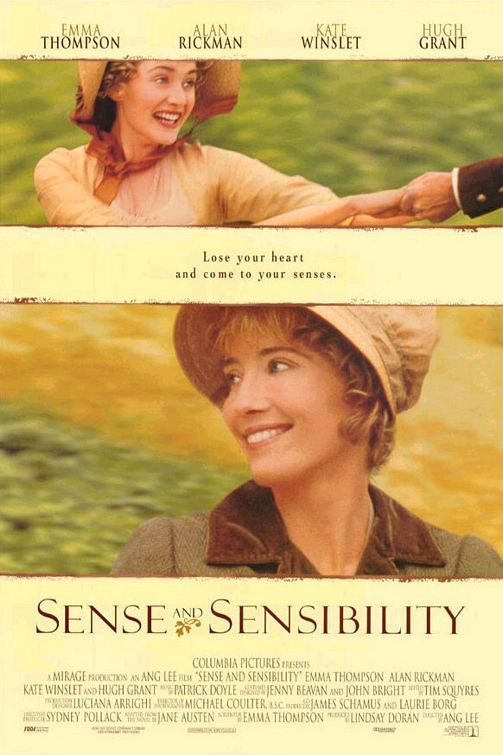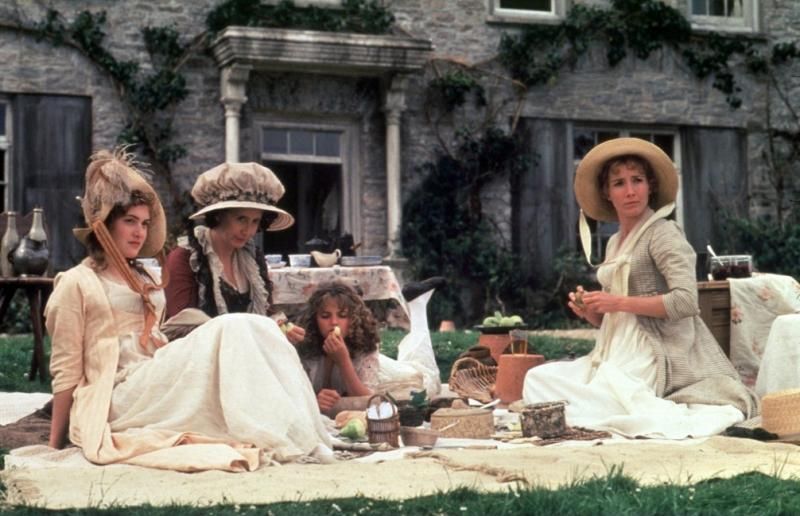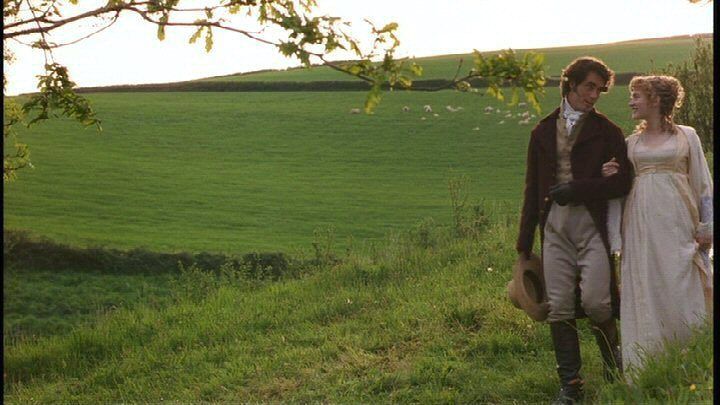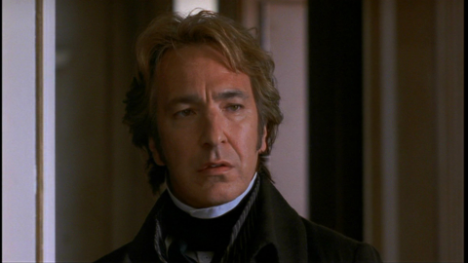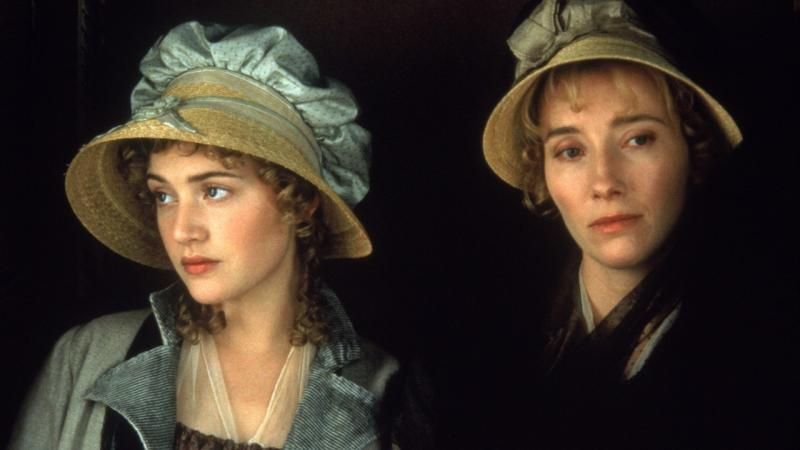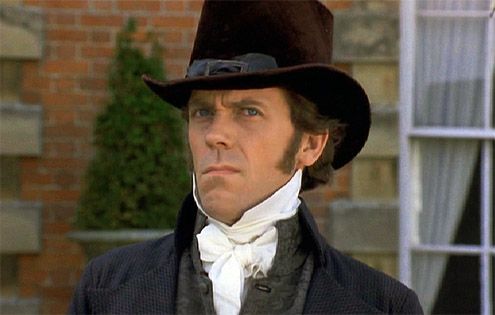Sense
and Sensibility
Director: Ang Lee
Starring: Emma Thompson, Kate Winslet,
Alan Rickman, Hugh Grant, Greg Wise
1995
While I know very well that this film is not in 1001 Movies, I love it so dang much that I'm going to go right ahead and review it anyway. Because it's awesome and it's one of my go-to comfort films. I've seen it more times than I can count, and I will continue to watch it over and over and over again in the future.
Throwing fuel on the fire of the Jane Austen craze that overtook Hollywood in the mid-nineties is this truly impeccable adaptation of Sense and Sensibility. I adore Austen, and I adore Austen movies and miniseries, but after a recent rewatch of nearly every Austen film in my library (an undertaking that took several days), I realized just how far above the rest this particular film was. It has a beauty, a heart, and a lyricism that others lack. Nominated for Best Picture at the Oscars in its year, it was beaten by Braveheart, a passable but forgettable epic. Sense and Sensibility, on the other hand, has only grown more beloved over time, at least in the circles I run in.
Throwing fuel on the fire of the Jane Austen craze that overtook Hollywood in the mid-nineties is this truly impeccable adaptation of Sense and Sensibility. I adore Austen, and I adore Austen movies and miniseries, but after a recent rewatch of nearly every Austen film in my library (an undertaking that took several days), I realized just how far above the rest this particular film was. It has a beauty, a heart, and a lyricism that others lack. Nominated for Best Picture at the Oscars in its year, it was beaten by Braveheart, a passable but forgettable epic. Sense and Sensibility, on the other hand, has only grown more beloved over time, at least in the circles I run in.
The
classic story focuses on Elinor (Thompson) and Marianne (Winslet) Dashwood,
sisters who must relocate to a simple country cottage after their father’s
death. Elinor is sensible and practical,
pragmatic in everything, whereas Marianne is a hopeless romantic, determined to
fall dreadfully in love. For Elinor, the
shy and composed Edward Ferrars (Grant) catches her eye, while Marianne falls
for the dashing and impetuous Mr. Willoughby (Wise), much to the chagrin of
Colonel Brandon (Rickman), who is desperately in love with her. Money and status and scandal put up
roadblocks, but our heroines are pure of heart, and true love triumphs in the
end.
Ang
Lee’s gorgeous camerawork combined with Emma Thompson’s Oscar-winning
screenplay adaptation bring this 200-year-old tale to life in a vivid, brilliant
manner. Ang Lee paints the film in lush,
supple golds and greens, casting his heroines in wonderfully warm candlelight
and golden sunsets. The countryside
looks as if it came out of a painting, with rolling green pastures and hills,
blue ponds, and low-hanging willows.
When peril begins to loom for our heroines and tragedy seems apt to take
over, the color palette changes to a cold, steely blue, with lots of rain and
cloud and fog, signifying the change in overall tone. But Lee brings us back to the warm tones of
the opening of the film for its closure, after danger is averted, ending with
such a beautiful shot of a country wedding, so golden in its happiness, that it
cannot help but bring a smile to the face.
Alan
Rickman has made a career of playing bad guys.
His looks, his accent, his basso profundo voice all lend themselves to a
villain. How refreshing that he is not
one here. His Colonel Brandon grows
increasingly heartsick, increasingly in love with Marianne, but it is his
restraint, his sad acceptance of the fact that she loves another, that makes
him the most interesting male character in the story. Ferrars is cute but a bit boring, more
interesting in his reflection through Elinor than in himself (perhaps a comment
on how far Hugh Grant is in over his head in this film), and Willoughby is
simply a plot device to confuse and mislead our heroines, but Brandon is real,
Brandon is substantive. His opening
scene as he first hears Marianne is positively hypnotic, and as he falls in
love with her in that moment, every single woman watching this film falls in
love with him. Who on earth wouldn’t
want a man to look at her the way Brandon gazes longingly at Marianne? When Marianne is taken ill, his quiet yet
desperate plea with Elinor to “give me an occupation or else I shall run mad,”
speaks volumes for his quiet love for her.
Thompson, in her screenplay, presents a truly satisfying relationship
between Brandon and Elinor. Elinor
clearly understands that Brandon loves her sister but that her sister loves
Willoughby, yet she has a feeling that her sister has chosen wrongly. Elinor and Brandon have a bond, a friendship,
that lends a depth to both characters.
Colonel Brandon is one of Austen’s purest, truest heroes, and Rickman
gives him such heart, such life, such romanticism, that every time I watch this
film, I fall more and more in love with him.
Kate
Winslet roared onto the Hollywood scene with this role, which she filmed when
she was only nineteen years old. She was
nominated for Best Supporting Actress for her role, the first of her six (thus
far) Oscar nominations (finally winning in 2009). She is truly a whirlwind in the role;
impetuous, carefree, strong-willed, and impulsive, heedless of society’s
strictures on a lady’s behavior. She is
the highest high and the lowest low, flying back and forth between the two as
only a teenager could. Marianne’s
ultimate growth is that she learns from her heartbreak, learns to temper her
behavior. She is not domesticated, per
se, but after flying too close to the sun, she learns to balance herself, to
learn more from her sister. Winslet
pulls off this transformation with utmost believability, and in the years
following this film, she has proved, again and again, that she in undoubtedly
one of our finest leading ladies of the time.
In
contrast to headstrong Marianne, there MUST be a level-headed, careful Elinor,
and Emma Thompson is the cautious heart of the film. Personally, I am much more apt to sympathize
with Elinor and her careful repression than Marianne’s recklessness. I adore Thompson’s portrayal of Elinor,
mostly because Thompson is very mindful to show us the cracks in Elinor’s
well-studied façade of calm and tranquility at all the right moments. They are subtle; a sharp intake of breath here,
an uncertain word there, but they all combine to convince us that this is a
woman very much in love, but disappointed in her love. One of the most stunning scenes in the entire
film, a scene which wrenches my heart every single time, is where Elinor reveals
to Marianne that she has known she cannot be with Edward for months, keeping it
a secret. Thompson explodes in her
heartbreak at her sister’s shallow condemnation of her lack of emotion. To me, this scene personifies Elinor, and
almost defines the film.
The
plotline becomes very serious in the second half, as life looks increasingly
bleak and sad for our heroines. The
intense drama is satisfactorily eased by light moments of humor, deftly placed
to alleviate the encroaching darkness.
Hugh Laurie, a college chum of Emma Thompson’s, is positively
scene-stealing as the bored and annoyed Mr. Palmer, a role that only has about
a half-dozen lines, yet he makes the most of it. His silly wife, played by Imelda Staunton, is
a fool but lightens the mood as well, and her mother, the loud and unstoppable
Mrs. Jennings, is worth a laugh every time she opens her mouth.
At
its heart, the relationship of the two sisters is paramount in this story and
this film. Elinor and Marianne may be
opposites in terms of their personalities, but they love each other very much
and would do anything for each other. This
is a romance, to be sure, but the romances of the film are nothing without the
devoted sisters going through life at each other’s sides. Having a sister myself (Meaghan, this one’s
for you), I simply adore the sisters and how much they love each other. This is an achingly beautiful film that
plumbs the emotional depths of Austen.
Without sounding too saccharine, it makes my heart soar to watch this
movie, and I find myself alternately moved to tears and smiles. Because really, who isn’t smiling when Elinor
bursts into tears of happiness when she realizes that Edward, feared lost to
her forever, loves her after all?
Arbitrary
Rating: 10/10.
